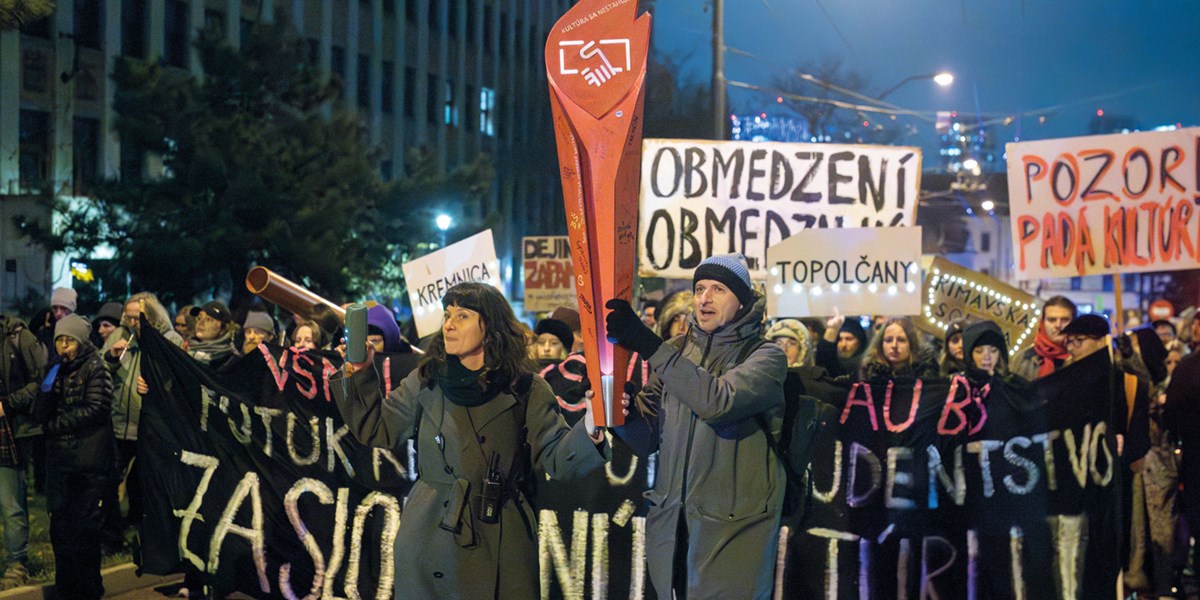Thursday, April 10, 2025
Slovak arts scene struggles under government crackdown as Minister of Culture pushes nationalist agenda
By Kim Burton
Tensions are growing in Slovakia as the government takes culture under its control

After being lit 22 days earlier to illuminate the dark period of Martina Šimkovičová’s Ministry of Culture, the Slovak Cultural Torch arrives in Bratislava on December 12, 2024, for the Koncert Za Budúcnosť Kultúry (Concert for the Future of Culture)
When Robert Fico assumed office as Slovakia’s prime minister in October 2023, he installed the right-wing nationalist Martina Šimkovičová as Minister of Culture. Since then, she has led a concerted effort to command all aspects of culture (theatre, art, opera, folk music, etc.). She has sacked the directors of Slovak National Theatre and Slovak National Gallery without reason, is replacing the public broadcaster RTVS with a new state-run broadcaster, STVR, and is pushing through changes to the country’s leading provider of arts funding, the formerly independent Slovak Arts Council (FPU), giving the government greater say in where funding goes. Demonstrations and petitions for Šimkovičová’s resignation have been regular occurrences since her appointment.
The country’s small but lively folk and world music scene has been especially vulnerable to these changes. Jarmila Vlčková, an organiser of World Music Festival Bratislava, explains: “Traditional music is huge here; almost every village has a traditional music ensemble and in the summer each region has a festival with young and old playing and singing together. Some of those raised in that tradition become versatile professionals in classical, jazz and electronic music, or the rich world music scene. We are a small NGO without direct support from the government, so [we] depend on writing applications for funding. Now that the Arts Council is no longer independent, many festivals haven’t received grants.” She continues: “Last year, at the biggest folk festival, Východná, the Minister emphasised that ‘folklore is the soul of our nation, a mirror of our roots and a heritage that we must pass on to future generations with love and pride.’ A year later and the vivid Slovak folk scene is faltering. The Slovak Arts Council has never been in such a desperate situation, with the Ministry of Culture repeatedly blocking the fund’s activities.” Festivals have begun cancelling; the uncertainty also applies to universities, cultural centres, galleries and libraries, with all projects linked to LGBTQ+ groups now excluded from public subsidies.
Authoritarian nationalist regimes such as Fico’s put great stress on promoting national culture, yet attempts to co-opt Slovakia’s folk scene have been met with opposition. Spearheading the resistance is the organisation Nie v Mojom Kroji (Not in My Folk Outfit), formed in 2020 in response to a rise in far-right extremism. Singer Júlia Kozáková, one of their members, says that “traditional motifs on party posters [and] the presence of campaign and party stalls at regional folklore festivals” are ways in which far-right politics is using folklore symbolically while failing to actually support it.
Slovakia is a small country – approximately 5.5 million people – with a history of repressive rule, says Vlčková, and Slovaks self-mockingly call themselves a ‘pigeon nation’, whose people keep their heads down, but things are changing. When I ask what we might do, her answer is simple: “The situation for cultural financing is worsening, yet we will not give up. The 10th edition of World Music Festival Bratislava will take place without the support of the Slovak Arts Council. But international interest and solidarity is crucial if we want to preserve culture in all its variety, not just in Slovakia but globally.”

